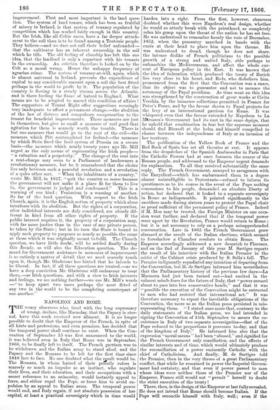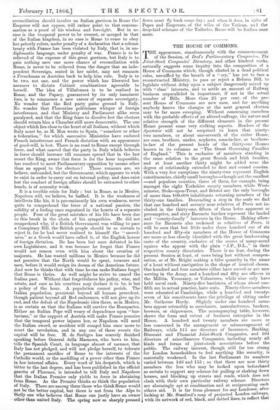NAPOLEON AND ROME.
THE weary observers who, tired with the long supremacy of wrong, declare, like Macaulay, that the Papacy is eter- nal, have this week received new aliment. It is no longer possible to doubt that the Emperor of the French, in spite of all hints and professions, and even promises, has decided that the temporal power shall continue to exist. When the Con- vention of September 15 was first announced to the world, it was believed even in Italy that Rome was in September, 1866, to be finally left to itself. The French garrison was to be withdrawn and the Italian army to stand aloof, and the Papacy and the Romans to be left for the first time since 1848 face to face. No one doubted what the rsult would be. The Romans, in whom hatred of their priestly rulers is scarcely so much an impulse as an instinct, who regulate their lives, and their education, and their occupations with a secret reference to an animosity, would instantly appeal to force, and either expel the Pope, or force him to avoid ex- pulsion by an appeal to Italian arms. The temporal power would end, and Italy regain, if not absolute possession of her capital, at least a practical sovereignty which in time would
harden into a right. From the first, however, observers doubted whether this were Napoleon's real design, whether he would so utterly break with the priesthood, so completely relax his grasp upon the throat of the nation he has set free. He was understood to remember keenly the vote of December, 1852, when the peasantry marched in bands with the cures at their head to place him upon the throne. He was understood to dread, though he does not share, the intense dislike of French politicians to the possible growth of a strong and united Italy, able perhaps to enfranchise the Mediterranean, and affect the whole cur- rent of European policy in the East. It was known that the idea of federation which produced the treaty of Zurich lies very close to his heart, and Reds, who disbelieve him, pronounced from the first that the Convention was a snare, that its object was to guarantee and not to menace the autonomy of the Papal peculium. As time went on this idea was strengthened by the construction of great works at Civita Vecchia, by the immense collections permitted in France for Peter's Pence, and by the favour shown to Papal projects for the levy of an international garrison for Rome. It was whispered even that the favour extended by Napoleon to La Mrmora's Government had its root in the same de.sig,n, that he upheld that combination in fear lest the supreme moment should find Ricasoli at the helm, and himself compelled to choose between the independence of Italy or an invasion of her territory.
The publication of the Yellow Book of France and the Red Book of Spain has set all theories at rest. It appears from the despatches of the Spanish Ambassador in Paris that the Catholic Powers had at once foreseen the course of the Roman people, and addressed to the Emperor urgent demands for explanation. To all they received substantially the same reply. The French Government, annoyed to savageness with the Encyclical—which has embarrassed them to a degree almost unintelligible to Protestants—refused to inform its questioners as to its course in the event of the Pope making concessions to his people, demanded an absolute liberty of action, but declared that it looked to a separate sovereignty in Rome as indispensable. It pointed significantly to the sacrifices made during sixteen years to protect the Papal chair as proof sufficient of the permanent policy of France. Indeed if M. Mon may be trusted, the Foreign Minister on one occa- sion went further, and declared that if the temporal power were upset by the Revolution, France would return to Rome ; but it is not necessary to rely on a perhaps misapprehended conversation. Late in 1865 the French Government grew alarmed at the result of the Italian elections, which seemed to foreshadow a Chamber resolute to obtain Rome. The Emperor accordingly addressed a new despatch to Florence, and on the 2nd of January of this year M. Sartiges reports the result of his interview with the Italian Premier in the midst of the Cabinet crisis produced by S. Sella's fall. The Premier indignantly repudiated any intention of departing from the Convention, but M. de Sartiges informed him nevertheless that the Parliamentary history of the previous few days—La Marmora had just been turned out—had excited in the calmest minds fears for the future of Italy, that "power seemed about to pass into less conservative hands," and that it was " possible the execution of the Convention might be entrusted to men who had resisted that international act." It was therefore necessary to repeat the inevitable obligations of the Convention, the more so as the Italian press persisted in mis- representing them. " I stated once more that, contrary to the daily statements of the Italian press, we had intended in signing the Convention of 15th September to assure the co- existence in Italy of two separate sovereignties—that of the Pope reduced to the proportions it possesses to-day, and that of the kingdom of Italy." He informed him also that the expression "moral means " had been "abused," and signified for the French Government only conciliation, and the effects of similar interests and of time, which would ultimately produce the reconciliation of a power eminently Catholic with the chief of Catholicism. And finally, M. de Sartiges told the Premier, then in the very throes of a great Parliamentary conflict, that while he remained in power the Imperial Govern- ment had certainty, and that even if power passed to men whose ideas were neither those of the Premier nor of the Emperor, France still would not " permit " herself to doubt the strict execution of the treaty!
There, then, is the design of the Emperor at last fully revealed. He does not intend that Rome should become Italian. If the Pope will reconcile himself with Italy, well ; even if the
reconciliation should involve an Italian garrison in Rome the Emperor will not oppose, will rather point to that consum- mation as a proof of his wisdom and foresight. But in no case is the temporal power to be overset, or merged in that of the Italian kingdom, in no case is Rome to cease to obey her priestly rulers, under penalty of a declaration that a solemn "treaty with France has been violated by Italy, that is, in un- diplomatic language, under penalty of war. France is to be relieved of the expense of this great garrison, but Italy is to gain nothing save one more chance of reconciliation with Rome, is never to be relieved from the danger that an inde- pendent Sovereign, seated in her midst, may not summon a Frenchman or Austrian back to help him rule. Italy is to be two, not one, and the power which has liberated her assumes to dictate Cabinet combinations agreeable to herself. The idea of Villafranca is to be realized in Rome, and the Papacy, guaranteed by its only imminent foes, is to commence a new career of separate sovereignty. No wonder that the Red party gains ground in Italy, No wonder that Florentine politicians whisper of foreign interference, and that Ministry and Parliament alike seem paralyzed, and that the King fears to dissolve lest the electors should return him a Chamber still more democratic. The one object which lies close to the heart of all Italians, without which Italy must be, as M. Mon wrote to Spain, " somehow or other a federation," for which successive Ministries have endured French interference and French dictation with an appearance of good-will, is lost. There is no road to Rome except through force, and what marvel that the party in Italy which believes in force should increase till rumours spread that in the last resort the King, aware that force is for the hour impossible, has resolved to meet Parliamentary opposition by means other than an appeal to the electors ? Those rumours are, we believe, unfounded, but the Government, which appears to wish to exist in order to carry out an internal policy, and does exist lest the conduct of foreign affairs should be entrusted to other hands, is of necessity weak.
It is a terrible crisis for Italy ; but in Rome, as in Mexico, Napoleon will, we believe, be baffled. It is the weakness of intellects like his, it is pre-eminently his own weakness, never quite to comprehend the force of a national passion, the solidity of a feeling once engrained in the hearts of a separate people. Four of the great mistakes of his life have been due to this break in the chain of his sympathies. He did not comprehend why, if a British Government was willing to pass a Conspiracy Bill, the British people should be so certain to reject it, for he had never realized to himself the " sacred- ness," as a Greek would have called it, of the English horror of foreign dictation. He has been but once defeated in his own Legislature, and it was because he forgot that France would not reason even with him about the creation of majorats. He has wasted millions in Mexico because he did not perceive that the North would be spent, treasure and men, before it would resign its dream of the American future. And now he thinks that with time he can make Italians forget that Rome is theirs. As well might he strive to cancel the Italian past. Without that forgetfulness his policy, wise, and astute, and sure as his courtiers may declare it to be, is but a policy of the hour. A population cannot perish. The Italian population, persistent beyond all human precedent, though patient beyond all Red endurance, will not give up its end, and the defeat of the Napoleonic idea there, as in Mexico, is as certain as that the Italians will survive the Bonapartes. Either an Italian Pope will weary of dependence upon " bar- barians," or the support of Austria will make France perceive that the temporal power injures her, or Napoleon will need the Italian sword, or accident will compel him once more to court the revolution, and in any one of these events the capital will be free. M. de Sartiges has scarcely finished speaking before General della Marmora, who bows to him, tells the Spanish Court, in language almost of menace, that Italy has not pledged, and will not pledge herself, to tolerate the permanent sacrifice of Rome to the interests of the Catholic world, or the meddling of a power other than France in her internal affairs. Every word of his despatch, which is bitter to the last degree, and has been published in the official gazette of Florence, is intended to tell Italy and Napoleon that the Italian Premier only yields to force in abstaining from Rome. As the Premier thinks so think the population of Italy. There are among them those who think Rome would not be the better capital, but there is not from the Alps to Sicily one who believes that Rome can justly have an owner other than united Italy. The spring now so sharply pressed
down must fly back some day ; and when it does, in spite of Popes and Emperors, of the wiles of the Vatican, and the deep-laid schemes of the Tuileries, Rome will be Italian once more.































 Previous page
Previous page